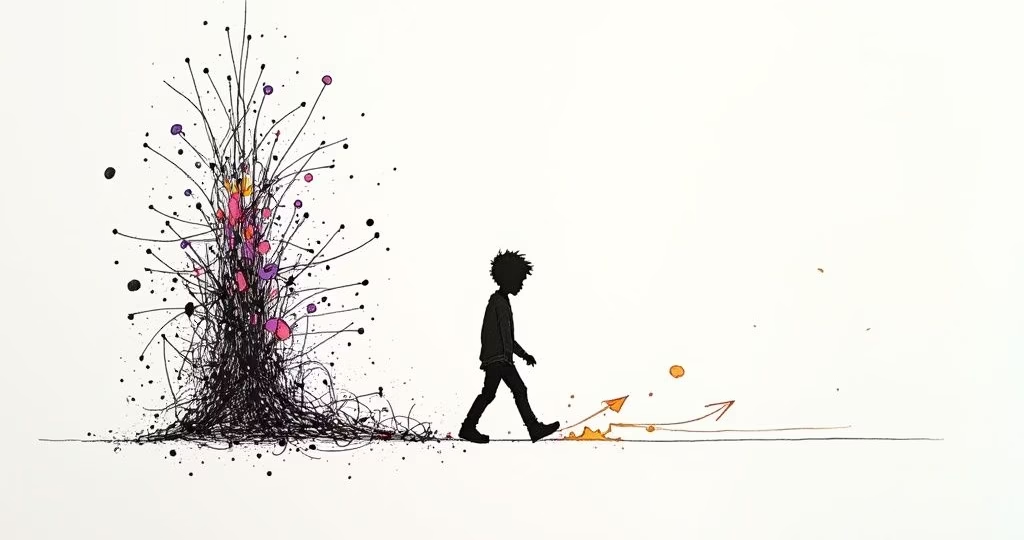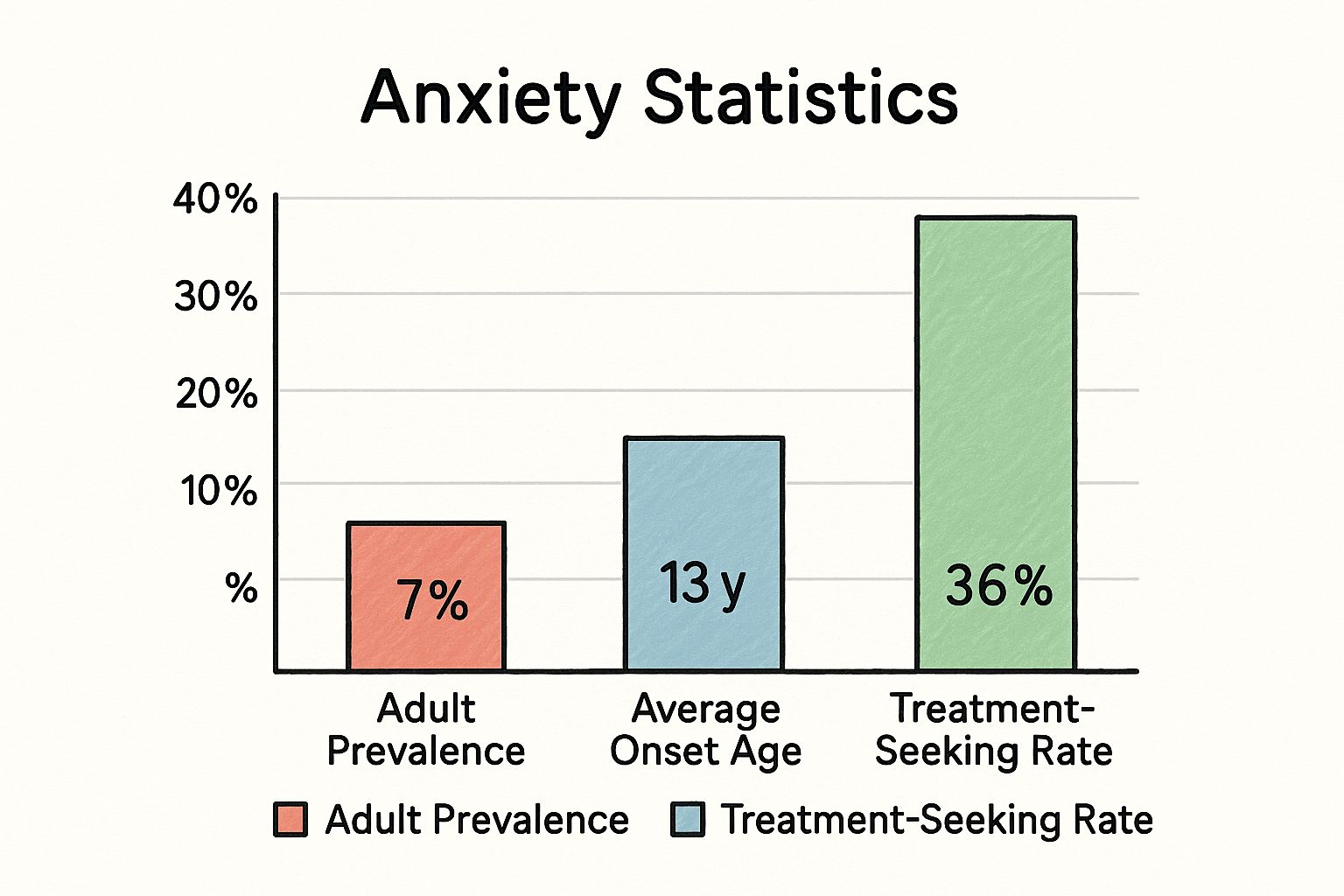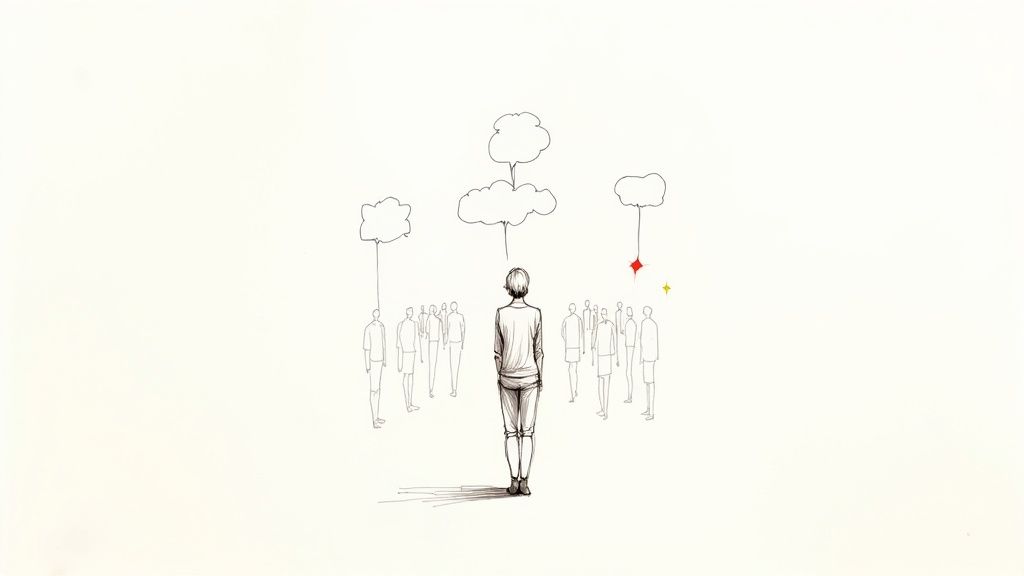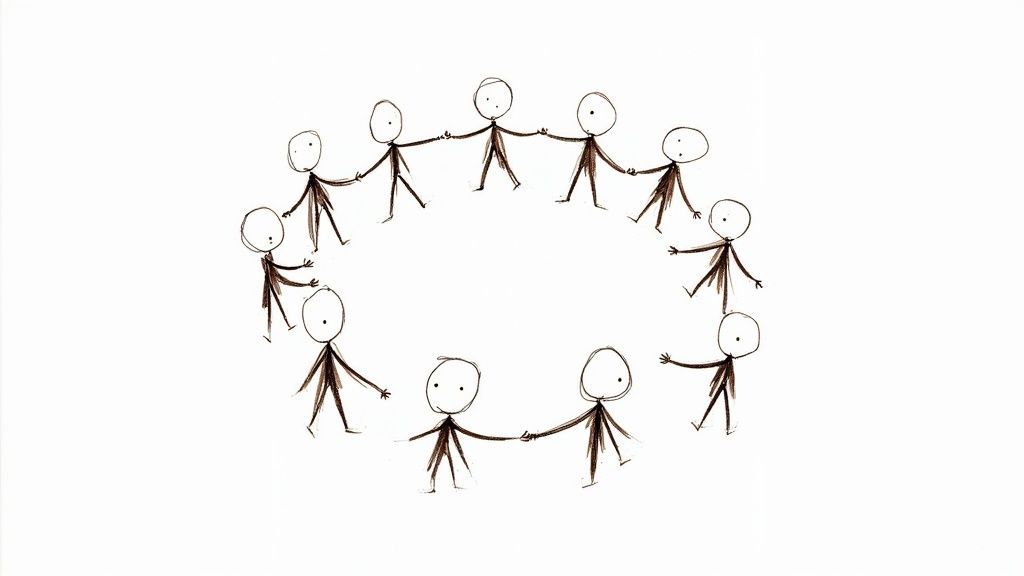
If you're dealing with social anxiety, you know it’s so much more than just being "shy." It's that pit in your stomach before you have to speak in class, the way your heart hammers against your ribs at a party, or that constant, nagging worry that you're being judged for every single thing you say.
It’s an intense, persistent fear that turns everyday interactions into high-stakes performances. This isn’t just in your head—it’s a real, physical response. Your brain’s threat detector goes into overdrive in social settings, triggering a fight-or-flight reaction. That’s why you might start sweating, trembling, or feeling nauseous when all you’re trying to do is join a conversation.
The Cycle of Avoidance and Anxiety
Social anxiety has a way of feeding itself. You think about a social event, your anxiety skyrockets, and you decide to bail. It feels like a relief in the moment, but that avoidance just reinforces the idea that social situations are dangerous.
This makes the next social event even more terrifying. It's a vicious cycle that can lead to feeling more and more isolated, causing you to miss out on friendships and experiences. You're not alone in this; research shows that social anxiety disorder (SAD) often starts during the teen years, a critical time for developing social skills and identity. That’s why figuring out how to overcome social anxiety now is so powerful.

The data really drives this home: social anxiety often begins when we're young, but so many people wait years before getting help. Early recognition and support can change everything.
Shyness vs. Social Anxiety
It’s really important to know the difference between being shy and having social anxiety. Shyness is a personality trait. Social anxiety is a mental health condition that can seriously get in the way of your life.
I’ve put together a quick table to show you what I mean.
Key Differences Shyness vs Social Anxiety
| Aspect | Typical Shyness | Social Anxiety |
|---|---|---|
| Intensity | Mild discomfort or nervousness in new situations. | Intense fear and panic before, during, and after social events. |
| Avoidance | May hesitate but usually participates. | Actively avoids social situations, even important ones. |
| Impact | Doesn't typically interfere with school, work, or relationships. | Significantly disrupts daily life, friendships, and goals. |
| Physical Symptoms | Blushing or slight nerves. | Panic attacks, sweating, trembling, nausea, rapid heartbeat. |
| Focus of Fear | General discomfort with new people. | Overwhelming fear of being judged, humiliated, or rejected. |
Understanding this distinction is the first step.
Shyness might make you feel a little awkward when meeting new people, but you usually warm up. Social anxiety, on the other hand, is driven by a deep fear of judgment that can make you want to avoid people altogether, which can take a toll on school, friendships, and just about everything else.
If these feelings are getting in the way of your daily life, learning some foundational strategies can be a game-changer. For some practical tips to get you started, you can check out our guide on how to reduce anxiety.
Rewiring Your Anxious Thoughts

That inner voice that fuels social anxiety can be a real jerk. It’s relentless, constantly whispering that you're being judged or that you're just about to make a fool of yourself. But here’s the thing: that internal critic isn't telling you the truth. It's using distorted thinking patterns—what therapists call cognitive distortions—that completely warp your perception of reality. Learning to spot and challenge these thoughts is a game-changer when you're figuring out how to overcome social anxiety.
Two of the most common mental traps are mind-reading, where you assume you know exactly what others are thinking (usually something negative about you), and catastrophizing, where your brain immediately jumps to the absolute worst-case scenario.
Sound familiar? Maybe a friend doesn't text back right away, and your anxious brain instantly decides they're mad at you (mind-reading) or that your friendship is totally over (catastrophizing).
These thoughts feel incredibly real, especially for teens trying to navigate complicated social circles and the constant pressure of school. This fear of judgment can even lead to procrastinating on homework, because the idea of getting negative feedback feels completely unbearable.
Challenging Your Inner Critic
Instead of just accepting these anxious thoughts as facts, you can learn to question them. Start thinking of yourself as a detective looking for actual evidence. When a negative thought pops into your head, pause and ask yourself a few questions:
- What's the evidence? Is there any actual proof that what I'm thinking is true? Or is it just a feeling?
- What's another perspective? Is there a different, maybe even more positive, explanation for what just happened?
- What would I tell a friend? If my best friend was in this exact situation, would I be this hard on them? (The answer is almost always no.)
This process, which is a core part of Cognitive Behavioral Therapy (CBT), helps you create some distance from the thought. It allows you to see it for what it really is—just a product of anxiety, not a reflection of reality. Breaking these thought patterns is fundamental to building confidence. We actually dive deeper into this in our guide on rewriting your personal narrative.
Resources for Teens and Young Men
For teen boys and young men, there's often this unspoken pressure to appear "strong" and keep it all together, which can make it even harder to admit you're struggling. Thankfully, there are resources out there designed specifically to help.
Organizations like The Jed Foundation and Active Minds provide solid mental health info and have chapters on college campuses that create supportive communities. For teen boys that are struggling, finding men's groups specifically for young men, both online and in person, also offer a space to connect with peers who get what you're going through, which can be huge for breaking that cycle of isolation.
The goal isn't to get rid of negative thoughts entirely—that’s impossible. It's about changing your relationship with them. When you can recognize them, question them, and consciously choose a more balanced perspective, you start taking back the control from your anxiety.
This mental reframing is a skill. It absolutely takes practice, but every single time you challenge an anxious thought, you weaken its power and build a stronger, more resilient mindset.
Build Confidence One Small Action at a Time
Confidence isn't something you're born with. It's a skill, and like any skill, you build it with practice. But when the thought of just "putting yourself out there" is completely overwhelming, the usual advice to "just do it" feels impossible.
Forget that. We're going to focus on a proven strategy called gradual exposure. It’s all about taking small, manageable steps that build real momentum.
Think of it like leveling up in a video game. You don't take on the final boss on day one. You start with small quests to gain experience and build your strength. This is exactly how we’re going to approach social anxiety—one small, intentional action at a time.
Creating Your Challenge Ladder
The heart of this approach is your personal "challenge ladder." This is basically a list you create of social situations, ranked from the least scary to the most terrifying. The whole point is to start at the bottom rung with something that feels just a little outside your comfort zone, but still totally doable.
Here’s an example of what a ladder might look like for someone who finds school interactions tough:
- Rung 1 (Low Anxiety): Make eye contact and give a slight nod to one person you pass in the hallway.
- Rung 2 (Mild Anxiety): Ask a classmate a simple, low-stakes question, like "Do you know what the homework is?"
- Rung 3 (Moderate Anxiety): Give someone a compliment on their shoes or backpack.
- Rung 4 (Higher Anxiety): Raise your hand to ask a question during class.
- Rung 5 (Highest Anxiety): Join a group conversation during lunch.
Once you’ve mastered a lower rung and it doesn’t feel so scary anymore, you move up to the next one. Every single success, no matter how small it seems, starts rewiring your brain. It teaches you that these situations aren't nearly as threatening as your anxiety makes them out to be.
Tackling Anxiety-Fueled Procrastination
This fear of judgment doesn’t just show up in social settings. It's a huge reason we procrastinate, especially with schoolwork. The thought of getting negative feedback or just not meeting expectations can make even starting an assignment feel like climbing a mountain. So we avoid it, which gives us a moment of relief but just creates way more stress down the road.
Breaking this cycle uses the exact same step-by-step method. Instead of seeing a massive project as one giant task, you break it down into tiny, concrete actions. "Write a history essay" becomes:
- Open a new document and just write the title.
- Find three credible sources online.
- Write only the introductory paragraph.
Each tiny task you check off gives you a small hit of dopamine, which builds the motivation to keep going. Facing these little academic fears builds the exact same kind of resilience you need for social challenges.
A simple guided meditation can make a huge difference before starting homework. Try this: Sit comfortably, close your eyes, and take five slow, deep breaths. With each exhale, imagine the pressure and anxiety leaving your body. This five-minute reset can clear your mind and make it so much easier to focus on that first small step.
If you're a parent, the best way you can support your teen is by celebrating the effort, not just the outcome. Acknowledge the courage it took for them to ask a question in class, whether they got the answer right or not. Your validation is a powerful motivator.
For teen boys and young men, who often face a ton of pressure to be "tough," just admitting this is a struggle is a massive step. Resources for young men like The Man Cave offer amazing programs and communities where they can connect and build emotional skills in a place that actually gets it.
Building confidence is a journey, and taking that first small step is always the most important part.
Your Go-To Coping Skills for Tough Moments

When your heart starts pounding and your thoughts spiral, you need a fire extinguisher for your anxiety. That's where coping skills come in. They aren't a long-term cure, but they are incredibly powerful in-the-moment tools to get you grounded when you feel completely overwhelmed.
The best way to manage a spike in anxiety is to get out of your head and back into your body. Grounding techniques are perfect for this because they pull you right back to the present moment.
A Simple Meditation Guide for Teens
Before walking into a tough situation—like giving a class presentation or just entering a crowded lunchroom—take two minutes for this meditation guide for teens. It can honestly make a huge difference in how you show up.
- Find a quiet spot. A bathroom stall, an empty hallway, or even just turning your chair to face a wall will do.
- Close your eyes and breathe. Take a slow breath in through your nose for four counts, hold it for four, and then exhale slowly through your mouth for six. Do this three times.
- Focus on one single sensation. Zero in on the feeling of your feet flat on the floor or your hands resting on your legs. Notice the solidness, the temperature.
- Set a simple intention. Silently tell yourself something like, "I can handle this," or "I am safe right now."
This quick pause breaks the anxiety cycle and gives your nervous system a chance to reset. It shifts your focus from "what if?" to "what is." I've also found that engaging in creative craft activities can be a fantastic way to calm down and feel a sense of accomplishment when your emotions are running high.
Building a Foundation of Resilience
While those in-the-moment skills are essential, your daily habits are what build long-term resilience. Think of your mental health like a battery; some things charge it up, and others drain it.
Here’s what really matters:
- Sleep: Getting 7-9 hours of good sleep is non-negotiable. A tired brain is an anxious brain. Period.
- Movement: Physical activity releases endorphins—your body’s natural mood boosters. Even a 15-minute walk is enough to clear your head.
- Nutrition: What you eat directly impacts your mood. Limiting caffeine and highly processed foods can help stabilize your energy and, in turn, reduce anxiety.
These habits are your secret weapon, especially when you’re dealing with the link between anxiety, school motivation, and procrastination. When you're well-rested and feeling good physically, you have more mental fuel to tackle tough assignments.
A parenting tip: one of the best ways to help is to create a home that supports these habits without adding pressure. Instead of asking, "Did you finish your homework?" try something like, "How about we take a quick walk before you get back to that?" This models healthy coping and offers support, not just another demand.
Social anxiety often kicks in during adolescence, with research from the National Institute of Mental Health showing most people feel their first symptoms around age 13. Just knowing this is a common and treatable condition is the first step. You're not alone in this.
Finding Your People and Asking for Help

Dealing with social anxiety can feel like you're stuck on a deserted island. But one of the most powerful things you can do is realize you don't have to navigate it alone. Connection is a basic human need, and building a solid support system is your best defense against the isolation anxiety thrives on.
The thought of opening up is probably terrifying. You might be worried people won't get it, or worse, that they'll judge you. But reaching out to a parent, a teacher you trust, or a close friend is a huge act of courage. It's the first step toward getting off that island.
How to Talk to Your Parents
Just starting the conversation is usually the hardest part. You don't need some big, rehearsed speech. A simple opening is all it takes.
- Try saying, "Can we talk later? There's something I've been struggling with."
- Or, "I've been feeling really anxious about school, and I think I might need some help."
- If talking face-to-face feels like too much, a text can work just as well: "Hey, I'm having a hard time with some anxiety stuff. Can we talk about it tonight?"
The goal is simply to crack the door open. Be as honest as you feel you can be about what's going on—the physical feelings, the racing thoughts, and how it’s messing with your schoolwork or motivation. If you want more guidance on building these communication muscles, our article on developing social skills for teens can be a huge help.
Tips for Parents Listening In
If your teen comes to you, how you respond in that moment can change everything. Your main job is to create a space where it’s safe for them to be vulnerable.
- Listen Without Judgment: Your first instinct might be to fix the problem, but hold back. Just listen. Validate what they're saying with phrases like, "That sounds incredibly difficult," or "Thank you so much for telling me."
- Offer Support, Not Solutions: Instead of jumping in with a plan, ask, "How can I support you with this?" This shows them you trust them and puts them in the driver's seat.
- Research Together: Offer to look into resources for mental health for teens with them. This signals that you're on their team and that you're taking what they're going through seriously.
Creating a home where it’s okay to not be okay is one of the greatest gifts you can give your child. It teaches them that asking for help is a sign of strength, not weakness.
Resources for Teens and Young Men
For teen boys, there’s often this unspoken pressure to "man up" and tough it out, which can make reaching out feel impossible. The good news is that more and more resources are popping up that get this, creating spaces specifically for young men to connect and talk without the pressure.
I've put together a table with a few solid starting points. These organizations get what teens and young men are going through and offer real, practical support.
| Resource Type | Organization / Example | What It Offers |
|---|---|---|
| Mental Health Education | The Jed Foundation | Provides educational resources, tools, and campaigns specifically for teens and young adults to protect their emotional health and prevent suicide. |
| Peer-to-Peer Support | Active Minds | A student-led organization that empowers college students to change the conversation about mental health on their campuses. |
| Community for Young Men | The Man Cave | Offers programs focused on building healthy masculinity and emotional intelligence for teen boys. A great resource for young men. |
| Community Support | Local Men's Groups | Offers a safe, non-judgmental community for men to share experiences, build connections, and support each other's personal growth. |
Finding a group or an organization where you can just be yourself, without fearing judgment, can be a total game-changer. It's not just about talking; it's about realizing you're not the only one, which is a huge step in building confidence and leaving social anxiety behind.
Some Common Questions I Get About Social Anxiety
When you're trying to work through social anxiety, a ton of questions pop up. It’s completely normal to wonder about the bumps in the road, what progress actually looks like, and what you’re aiming for. Let's clear up some of the most common concerns I hear from both teens and their parents.
Will I Ever Feel Completely "Normal"?
This is probably the biggest question I get. So many teens I work with worry they’ll never feel “normal” when they’re around people. But here’s the thing: the goal isn’t to magically transform into a fearless extrovert who loves the spotlight. It's about getting to a place where anxiety doesn't run your life.
Progress means you can join a conversation or give a presentation in class without that overwhelming feeling of dread. It doesn't mean you'll never feel nervous again. Everyone gets nervous sometimes. We just want to dial the anxiety down from a 10 to a manageable 2 or 3.
A simple but powerful practice is what I call mindful observation. Just sit quietly for a few minutes. Notice your anxious thoughts, but don't get tangled up in them. Picture them like clouds passing in the sky. This helps you learn that feelings come and go—they don’t define who you are.
What if I Have a Setback?
Setbacks are going to happen. They’re a totally normal part of this journey. You might have a fantastic week where you feel confident, and then one day, the anxiety wins and you find yourself avoiding something. That’s not failure. It’s just data.
A setback is an opportunity to learn. Ask yourself: What triggered the anxiety? What could I try differently next time? Real progress isn’t about being perfect; it’s about building resilience and learning to get back up.
Parenting Tip: How you react in these moments is everything. Instead of showing disappointment, try offering validation. Something like, "That sounds like it was really tough. I'm proud of you for even trying, and we'll figure out the next step together." This kind of support builds motivation and reminds your teen that it’s safe to struggle.
How Can I Stay Motivated at School?
Social anxiety and procrastination are best friends. The fear of being judged for your work can feel so overwhelming that it’s easier to just not start. If your motivation is low and procrastination is high, the key is to break things down into laughably small steps.
Instead of a huge task like "study for my test," your very first step could be "open my textbook to the right chapter." That's it. This lowers the mental barrier just enough to get you started.
For teen boys and young men, finding a solid peer group can be a game-changer for motivation. Groups like EVRYMAN and men's groups create spaces where guys can connect and talk about their challenges without that fear of being judged. When you see other people working through the same stuff, it’s a powerful reminder that you’re not alone and that you can get through it too.
At Andrew Petrillo Life Coaching, I get the unique pressures teens face with social anxiety, motivation, and school. I offer one-on-one coaching to build real-world skills, boost confidence, and create a clear path forward. Learn more about how I can help at https://andrewpetrillolifecoaching.com.
RELATED POSTS
View all



